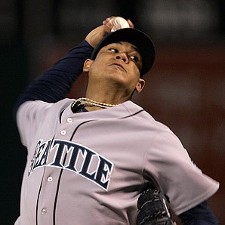The standard for wins by an American League pitcher was lowered to 16 last year. It is about to be lowered even further – to 13. That’s the number of games Felix Hernandez won this past season, and I expect he will be announced Thursday as the A.L. Cy Young award winner.
I could be wrong, of course, and I hope I am, but if I am, I will be surprised. By the time you read this, you may know if I am right or wrong.
I have no inside information on which to base my belief. I have not surveyed the voters. I don’t even know who the voters are, and I wouldn’t try to find out. I base my belief on what has been floating around about Hernandez and his season statistics.
The Seattle right-hander had the league’s lowest earned run average, 2.27; the lowest opposing batting average, .212; the most innings pitched, 249 1/3, and missed by two of having the most strikeouts (232). What he didn’t have was wins. When he won his last start of the season, he finished above .500 at 13-12.
Just a few years ago a pitcher with a 13-12 record would never have been considered for the Cy Young award. But last year Zack Greinke won the A,L, award with 16 victories and Tim Lincecum won his second straight National League award with 15 wins.
The development, I believe, is directly related to the growing influence of the new-fangled statistics which readers of this site know I have no use for, a fact that sends stats-freak denizens of the blogosphere into a stats-freak frenzy.
“Look out, he’s at it again” the cry will go out, as if a carrier of the black plague were loose in the land. And a flood of e-mail messages will pour in to my inbox calling me vile names (they are only the best educated and articulate of responders) and telling me I don’t know what I’m talking about.
But I do know one thing. I know that Roy Halladay, a fellow who knows something about pitching, agrees with me.
Besides his otherwise impressive statistics, the best argument Hernandez has going for him is his lack of run support. Elias Sports Bureau says the Mariners’ 3.06 runs per Hernandez start was the A.L.’s lowest. The Mariners say in Hernandez’s 12 losses, the team scored a total of seven runs while he was in the game.
I accept that those figures represent terrible run support and would make it difficult for any pitcher to win. But not impossible. I have long believed that good pitchers find a way to win. Two examples:
Steve Carlton compiled a 27-10 record in 1972 for a Phillies team that otherwise had a 32-87 record. Carlton led the league with a 1.97 e.r.a., 30 complete games, 310 strikeouts and 346 1/3 innings pitched.
 Murry Dickson was a 20-game winner for one of the most inept teams in history, the 1951 Pirates, whose 64-90 record belied their level of talent. The only reason they didn’t finish last was Dickson’s 20 wins.
Murry Dickson was a 20-game winner for one of the most inept teams in history, the 1951 Pirates, whose 64-90 record belied their level of talent. The only reason they didn’t finish last was Dickson’s 20 wins.
Both Carlton and Dickson had more run support than Hernandez, but both found ways to win in spite of the teams they played for.
In a conference call with baseball writers to discuss his Cy Young award Tuesday, Halladay was asked about Hernandez and the Cy Young award given his low victory total.
“It’s tough,” Halladay said. “Felix’s numbers are very, very impressive, but ultimately they look at how guys are able to win games. Sometimes the run support isn’t there, but you find ways to win games. Guys who are winning deserve a strong look no matter what Felix’s numbers are. When teams bring pitchers over, ultimately they want to win games.”
But in this new age of formulas for every action on a baseball field, acronyms have replaced wins. Mythical replacement players have become more important than wins and losses, unless the wins and losses are adjusted by other formulas.
Probably the most visible sign of the metric takeover of baseball coverage is the frequency of its use in The New York Times, for whom I covered baseball for four decades with nary a mention of Total Zone Total Fielding Runs Above Average.
That mouthful – or eyeful – of a metric, according to Tyler Kepner of the Times, tries to calculate each player’s overall contribution on defense.
The Times has increasingly used statistically-based columns, often at the expense, I believe, of the kind of baseball coverage it used to emphasize. But Kepner’s use of “Total Zone Total Fielding” was the clincher, demonstrating that the Times has gone over to the dark side.
Kepner, the Times’ national baseball writer, used the statistic in reporting that metric men were critical of the selection of Derek Jeter, the Yankees’ shortstop, as the Gold Glove shortstop. The Total Zone formula, Kepner wrote, rates Jeter 59th, or last, among major league shortstops.
“Within an hour of Tuesday’s announcement of the American League Gold Glove awards,” he wrote as he planted both feet firmly on the dark side, “editors at Baseball-Reference.com summed up the general reaction to Derek Jeter’s latest victory at shortstop: ‘We can’t believe it either,’ a notation briefly on the site said.”
If Hernandez doesn’t win the Cy Young award, I suspect the metric men will come out in critical force. But to me, this is the wrong year for Hernandez, I think he’s the best pitcher in the league, and I think he should have won the award last year. But not this year, not with 13 wins, whatever his other statistics, whatever his run support.
“Do wins count anymore? I don’t think they count as much,” said Jack O’Connell, secretary-treasurer of the Baseball Writers Association, whom I call the curator of the post-season awards. “I think these stats will play into it. I don’t like that. Some say wins don’t count. Someone wrote recently that Bob Welch shouldn’t have won in 1990. He won 27 games.”
O’Connell said he thought wins started to become devalued in 2005 when Bartolo Colon won the award with 21 wins. “People complained that he won because of his wins,” O’Connell said.
He agreed with me that Lincecum won last year with 15 wins because two St. Louis starters, Adam Wainwright (19 wins) and Chris Carpenter (17) split the vote. Wainwright received 12 first-place votes, Lincecum 11 and Carpenter 9. Lincecum had 100 points, Carpenter 94 and Wainwright 90.
“This could happen with Hernandez this year,” O’Connell said. “Sabathia and Price could split votes. I suspect as long as these stats are out there people are going to use them. I’m not saying that’s a bad thing. But wins do matter.”
The Yankees’ CC Sabathia won 21 games; no pitcher won 20 last year. Sabathia’s feat should count for something, but in the new age, the standard that stood for excellence for more than 100 years means nothing. It is ignored. It is not a factor. The stats capellers know better and have better standards.
But know these facts about Hernandez:
He had to win his last start of the season to finish with a winning record.
Seventeen pitchers in the American League won more games than he did, and seven others won as many.